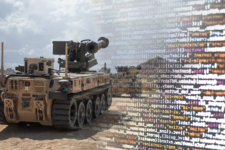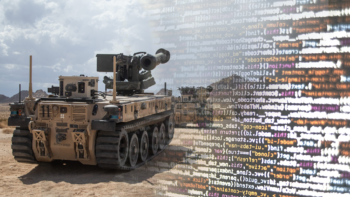
Network connection and global data exchanges on blue planet earth. Elements of this image furnished by NASA (Getty images)
WASHINGTON — The tech firm Lumen has officially started work to deliver on a $1.5 billion contract with the Defense Information Systems Agency (DISA), after a weeks-long delay caused by a protest over the award.
Under the indefinite delivery/indefinite quantity Indo-Pacific Transport Services (IPTS) contract, Lumen will provide DISA with “high-capacity, end-to-end communications services,” like internet, ethernet and wavelengths, in its US Indo-Pacific Command area of responsibility, Lumen said in a Nov. 1 press release.
“We’re delivering the always-on network infrastructure so the U.S. Department of Defense can focus on its mission to enhance the stability of the Asia Pacific region, promote security cooperation with our allies and partners, respond to emerging situations, deter aggression and if necessary, fight to win,” Zain Ahmed, senior vice president of public sector at Lumen, said in a statement.
The IPTS contract, initially awarded to Lumen on Aug. 1, was challenged by Verizon, which filed a protest with the Government Accountability Office (GAO) on Aug. 10 alleging the award violated procurement laws, according to Colleen Eagan, legal counsel of the Defense Information Technology Contracting Organization.
According to Eegan, Verizon officially withdrew its protest on Sept. 8 and the GAO dismissed the protest the following day. DISA officially proceeded with the contract on Sept. 12. Though it was just announced this week, Lumen started working with DISA on Oct. 3 and the period of performance for the contract runs through Oct. 2, 2032.
“Due to Verizon’s protest, DISA, in accordance with the Competition in Contracting Act, suspended Lumen’s performance of the IPTS contract until the protest was resolved,” Eagan said in a statement to Breaking Defense Tuesday.
INDOPACOM has become an increased focus of the Pentagon and military services. Danielle Metz, then-chief IT strategist for the office of the secretary of defense, said in April that DoD was planning to deliver a cloud-based tool this year first to INDOPACOM. And the Army, most recently on the classified network side, has also been focused on the region by extending its infrastructure modernization efforts out into the region.
“We are also aligning a lot of our tactical applications of emerging technologies, cloud, tactical cloud, data fabrics, also to INDOPACOM [area of responsibility] because what we want to do is get plenty of reps and sets and learn by doing,” Lt. Gen. John Morrison, Army deputy chief of staff (G-6), said in April.






















